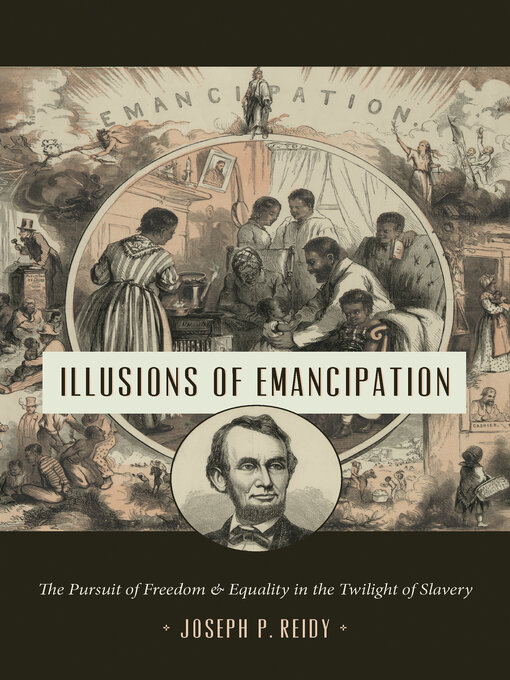- Fiction
- Nonfiction
- Biographies and Autobiographies
- Religion and Spirituality
- Politics
- Battle of the Books 2023
- RCCC Library Picks
- See all
-
Description
-
Details
-
Reviews
In this sweeping reappraisal of slavery's end during the Civil War era, Joseph P. Reidy employs the lenses of time, space, and individuals' sense of personal and social belonging to understand how participants and witnesses coped with drastic change, its erratic pace, and its unforeseeable consequences. Emancipation disrupted everyday habits, causing sensations of disorientation that sometimes intensified the experience of reality and sometimes muddled it. While these illusions of emancipation often mixed disappointment with hope, through periods of even intense frustration they sustained the promise that the struggle for freedom would result in victory.

Kindle Book
- ISBN: 9781469648385
- Release date: March 18, 2019
OverDrive Read
- ISBN: 9781469648385
- Release date: March 18, 2019
EPUB ebook
- ISBN: 9781469648385
- File size: 24753 KB
- Release date: March 18, 2019

Loading
Formats
Kindle Book
OverDrive Read
EPUB ebook
subjects
Languages
English
In this sweeping reappraisal of slavery's end during the Civil War era, Joseph P. Reidy employs the lenses of time, space, and individuals' sense of personal and social belonging to understand how participants and witnesses coped with drastic change, its erratic pace, and its unforeseeable consequences. Emancipation disrupted everyday habits, causing sensations of disorientation that sometimes intensified the experience of reality and sometimes muddled it. While these illusions of emancipation often mixed disappointment with hope, through periods of even intense frustration they sustained the promise that the struggle for freedom would result in victory.

-
Details
Publisher:
The University of North Carolina Press
Kindle Book
ISBN: 9781469648385
Release date: March 18, 2019
OverDrive Read
ISBN: 9781469648385
Release date: March 18, 2019
EPUB ebook
ISBN: 9781469648385
File size: 24753 KB
Release date: March 18, 2019
-
Creators
- Joseph P. Reidy - Author
-
Formats
Kindle Book
OverDrive Read
EPUB ebook
-
Languages
English
-
Reviews

Loading
Why is availability limited?
×Availability can change throughout the month based on the library's budget. You can still place a hold on the title, and your hold will be automatically filled as soon as the title is available again.
The Kindle Book format for this title is not supported on:
×Read-along ebook
×The OverDrive Read format of this ebook has professional narration that plays while you read in your browser. Learn more here.
